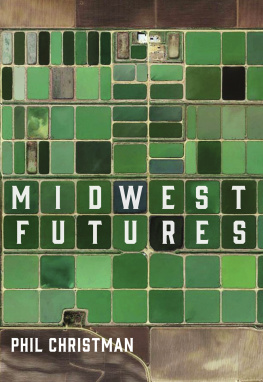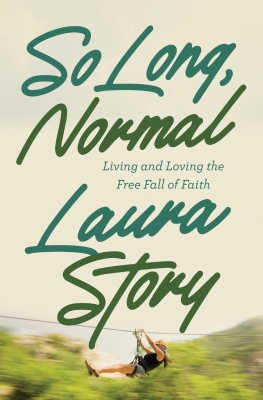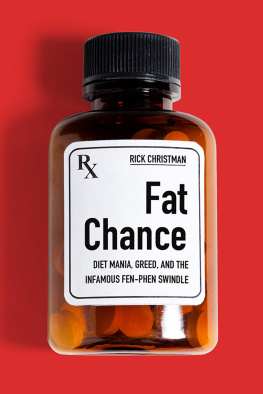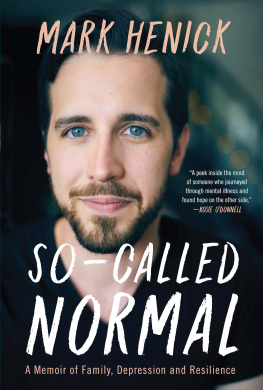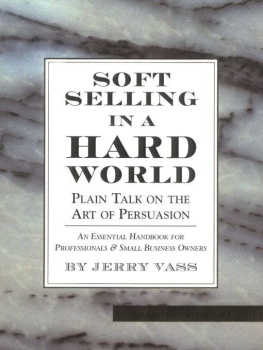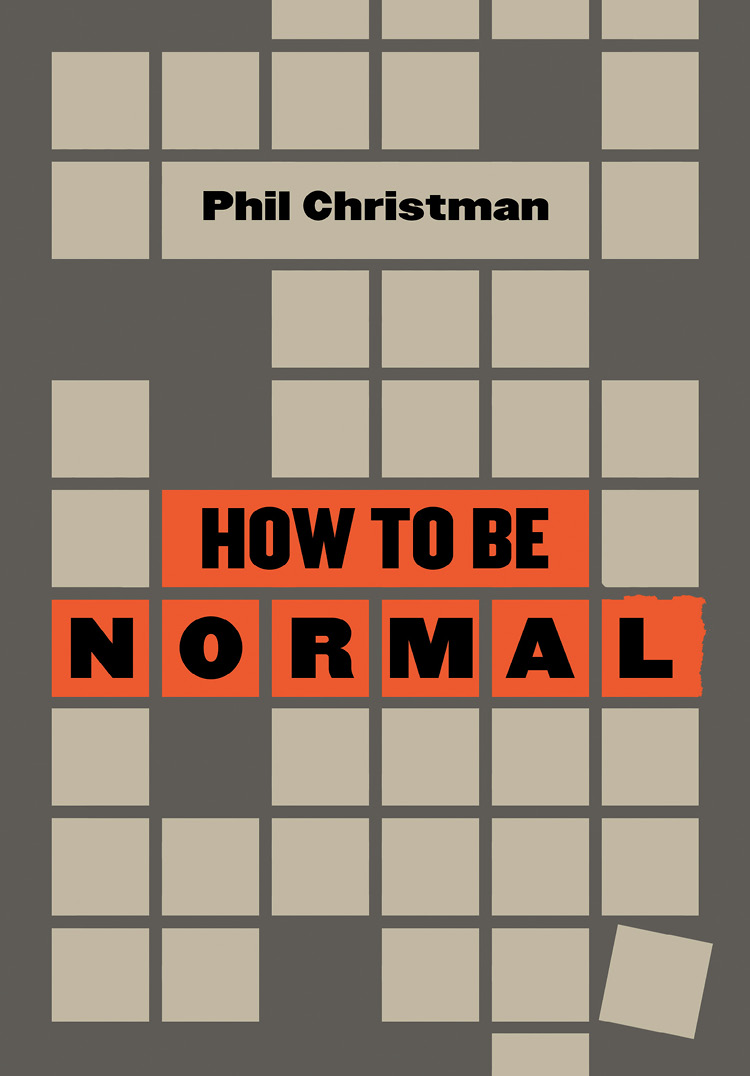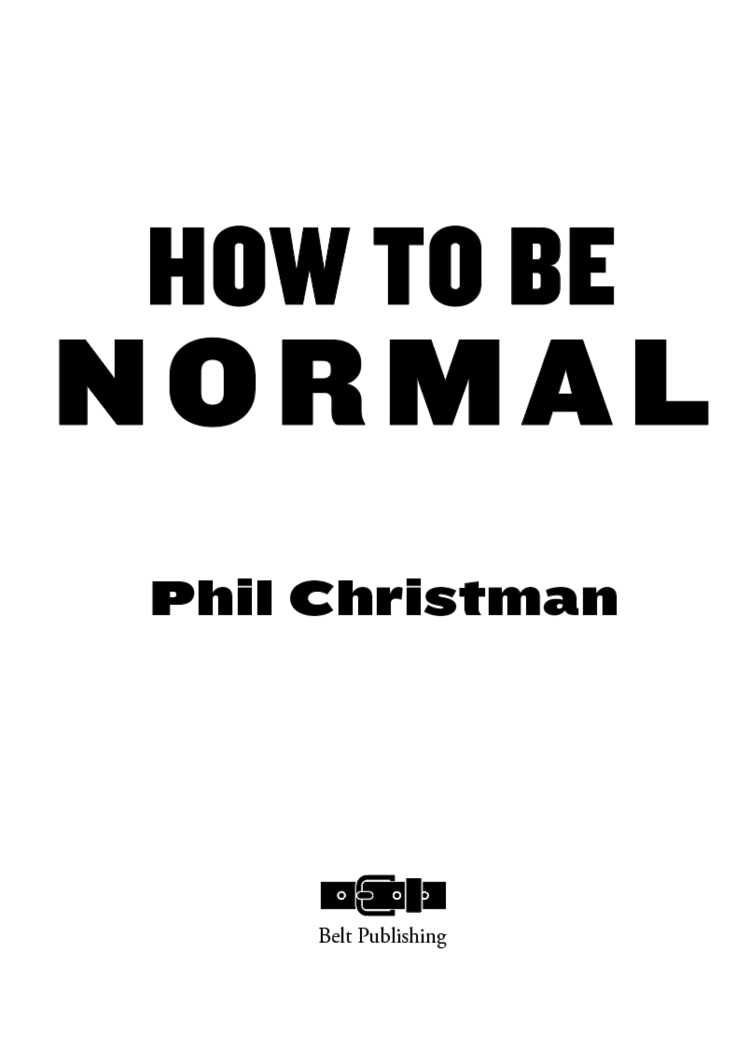Copyright 2022 by Phil Christman
All rights reserved. This book or any portion thereof may not be reproduced or used in any manner whatsoever without the express written permission of the publisher except for the use of brief
quotations in a book review.
Printed in the United States of America
First edition 2022
1 2 3 4 5 6 7 8 9
ISBN: 978-1-953368-28-7

Belt Publishing
5322 Fleet Avenue
Cleveland, Ohio 44105
www.beltpublishing.com
Cover art by David Wilson
Book design by Meredith Pangrace
Praise for Midwest Futures Winner of MIPA and IPPY Awards, and a Commonweal Notable Book of 2020
Christman stakes claim to his corner of a growing New Midwestern canon,
alongside the likes of Sarah Smarshs Heartland and Hanif Abdurraqibs
poetry as documentary. Aarik Danielsen, Rain Taxi Review of Books
A combination of history, memoir, reportage, and lit-crit that taught me a lot about a region Ive reported on. James Fallows, The Atlantic
To write about the Midwest is to risk joining a succession of truisms that tread and retread the same ground. Rather than try to pin the region to a single argument or narrative, [Christman] makes a mosaic out of its multiplicity.Megan Marz, Washington Post
This is a fantastic book by one of the most underappreciated writers of my
generation on a topic that isnt easy to write about. Its such a joy that
I zipped through it in a single day. Scott Beauchamp, Washington Examiner
Christman invites readers and others into a we that is responsible for
our future. He rejects the worst instincts of polarized discourse that
simply blames the other side.Noah Toly, Hedgehog Review
To B. D. McClay, who gave me the idea;
to Adam Petty, who gave me the title;
and to my dad, who gave me the anecdotes.
table of Contents
Authors Note
I wrote these essays between 2018 and 2021. In some cases, Ive recycled material from older pieces. They all fall under the general heading of cultural criticism or personal essayI say this now in order to gently let down any reader who has picked up the book in the hope of finding an advice manual. They all, in one way or another, examine things that have an air of banality, normativity, or averageness about them.
How to Be Normal
In the wake of the COVID-19 pandemic, we have the oddest relationship with the word normal. In the spring of 2020, wed type promises to each other, say, to have dinner or a beer when things are back to normal. At some point, everyone started adding scare quotes to normal. We invoke the word only to place it immediately under erasure, as though we were still, in spite of ourselves, hoping it will return anyway, as though normalcy were a cat that we pointedly ignore in the hope that it will allow us to pet it again.
Our longing for normalcy expresses itself in every area of culture. The US presidency was finally won by a man whose attraction rests mainly on the unspoken and impossible promise that he will restore the world of, say, 2014 or so. (That world was wretched and doomedit led directly to Trumpbut some people didnt know it yet, I suppose, and they miss not knowing.) The university where I work spent the first part of the fall 2020 semester pretending that things were back to normal. The dorms were openwhich is to say, the dorms were mostly closed, but they actually had some people in them. A student told me one daywe had met for office hours, outdoors, at six feet distance, both maskedthat she hadnt sat on a couch in two months: the only places she could go were her tiny dorm room, various campus lawns, and (if she had wanted to take her life into her own hands) a restaurant. All the common areas and study rooms were blocked off. Rightly, of course. The students were simultaneously dangerously concentrated together and horribly alone. Most of their classes took place online.
The proximate cause for this grim parody of normalcy was, most likely, the fact that one of our regents and major donors does double duty as a major owner of rental property in the city. That, at least, is my cynical reading of the situation, and its hard to go wrong banking on the venality of the American elite. But I think our situation has other causes. Even college presidents long for the recurrence of the seasons, the playing-out of predictable patterns. Some parents want their kids to have something as close as possible to their own long-falsified memories of being twenty. And there are those of us who are trying to be sober and responsibleoften to the point of becoming grotesquely passive-aggressive, savoring and sharing the hatred that wells up in us at every viral photo of unmasked restaurant patrons or beachgoerseven we dont really like thinking about any of this.
There was such a default of reliable information during the pandemic that even highly conscientious and informed people had to string together a Personal Safety Regime as eccentric and individualized as a late Godard film, against which almost anyone might transgress, so that we exchanged among ourselves the role of COVID heel so often that it rivaled the virus in its reach. And our societys collective insistence that essential workers risk death bred in many people a certain devil-may-care, damn-the-torpedoes spirit. Thus, it is hard for me to be mad at a grocery store worker who decided to spend Thanksgiving with Grandma.
Midway through the fall term, the graduate students at my university went on strike. (I spent a stormy Monday morning picketing with them and shivered pitifully in the car afterward, hoping that no one would take my bedraggled physical state for an index of the working classs strength.) Both because the focus of the strike was public healthstudents and supporters went about chanting things like What do we want? / Randomized testing! / When do we want it? / Last week! and because, like all strikes, it reminded everyone that workers are the real engine of any institution, it felt like an acknowledgment of reality in a season when every person in authority seemed intent on evading it. The grad students inspired further demonstrations of worker power from the universitys dining hall workers and residential assistants. I was proud of all of them, and hopeful for them, and I marched and picketed alongside them, and I canceled my own classes in solidarity and told other people to do so. And I hated every second. I wanted my routine back. I wanted to stop needing news all the time. I wanted to grade papers. In time, the university made some concessions, and we went back to our already-abnormal normal.
In the larger scheme of things, of course, there is no normal to get back to anymoreat least not one that most of us would recognize as such. The 2020 hurricane season was unprecedented, like the last several hurricane seasons. A million acres of the state of California have burned, and we are assured that such megafires will be common events over the next century. In February of 2021, my sister-in-law and her family, who live in Houston, lost power and water for most of a week, thanks to a record cold snap. (The governor of their state blamed this on the Green New Deal, a package of legislation that has yet to be enacted, or fully drafted.) We are ruled, locally and nationally and internationally, by greedy and silly people, to such an extent that the planet itself is altered, on a massive scale, from year to year, in accordance with their whims. The order of our world is disrupted down to the level of molecules and sperm cells. My father, when I talk to him on the weekends, cannot remember what day it is. We are all in exile.


